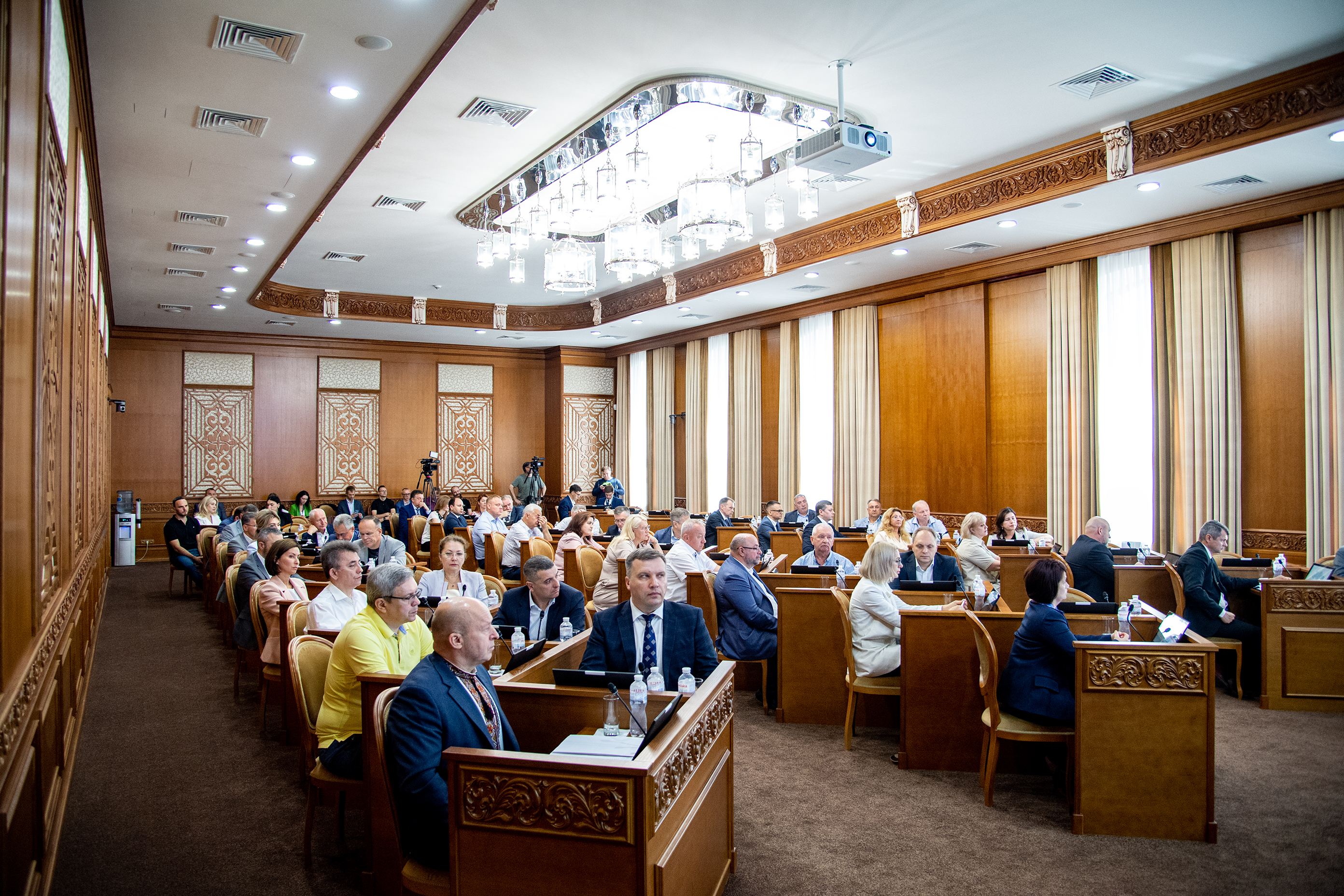Contact center of the Ukrainian Judiciary 044 207-35-46
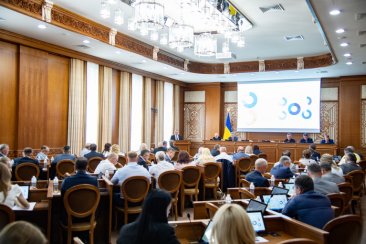
Since the beginning of the full-scale invasion of Ukraine by the Russian Federation and the declaration of martial law in our country, the judiciary has been faced with new challenges related to the administration of justice in times of war.
According to Art. 26 of the Law of Ukraine "On the Legal Regime of Martial Law", the justice in the territory under martial law shall be administered only by the courts of law. Expediting or accelerating any form of legal proceeding is prohibited.
On the first day of open aggression, questions arose as to how to ensure the administration of justice under martial law and the performance of constitutional functions, as well as how to preserve the lives and health of litigants, judges, and court staff. Today we can say that the judicial system has managed to deal with these issues.
This was emphasized by the President of the Supreme Court Stanislav Kravchenko at a meeting on the administration of justice under martial law with the participation of the leadership of the Supreme Court, the heads of Ukrainian appellate courts, the head of the High Anti-Corruption Court, the heads of the High Council of Justice, the High Qualification Commission of Judges of Ukraine, the Council of Judges of Ukraine and representatives of other state authorities.
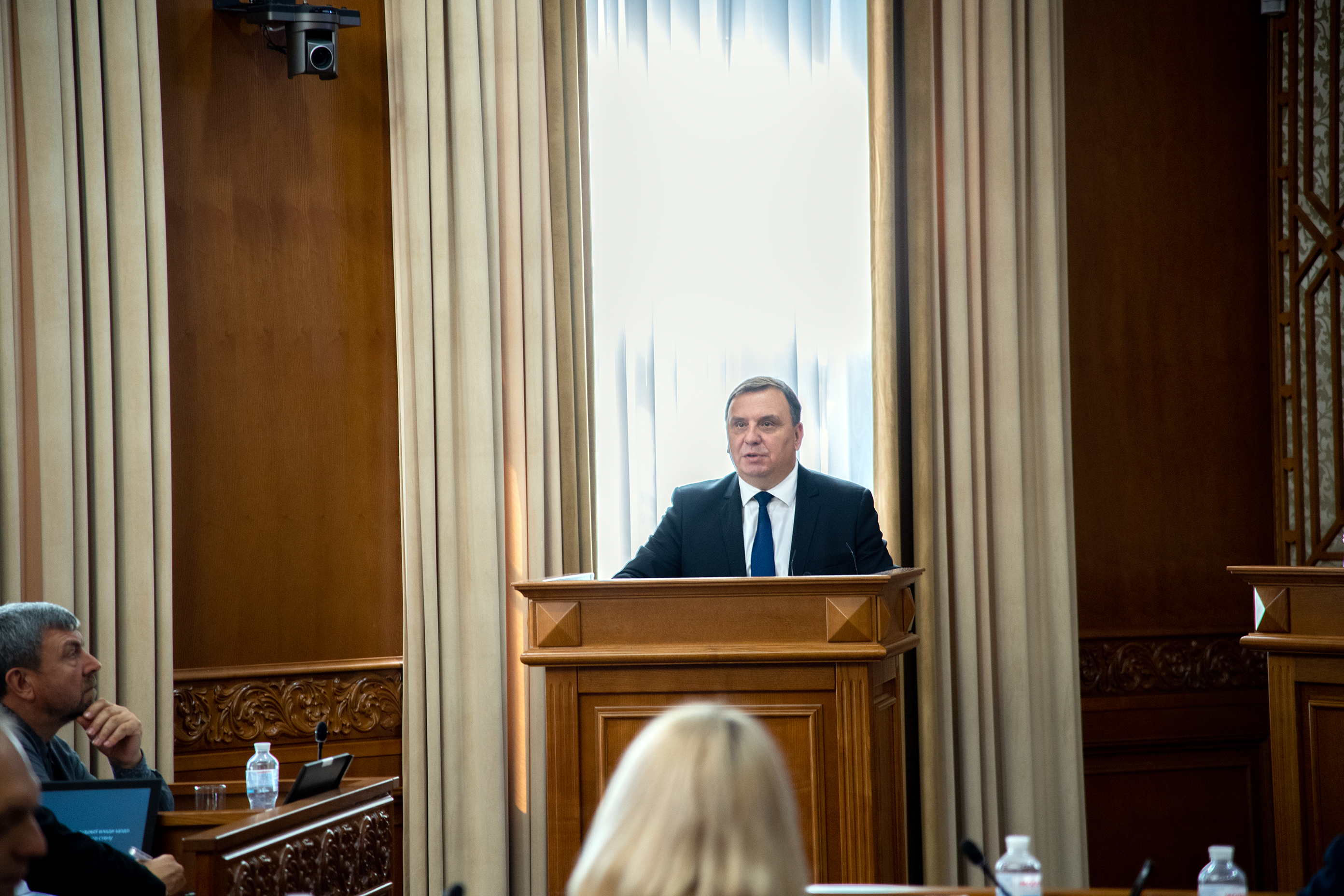
The President of the Supreme Court identified four categories of courts whose work had to be and is being organized in this difficult period. The first category is the most difficult and complex: these are the courts that remained in the temporarily occupied territories.
Back in the early days of the war, it came to a point where the High Council of Justice was not functioning. It was not until March 3, 2022 that the legislator determined that if it was impossible to change the territorial jurisdiction of the court that, for objective reasons, could not administer justice, the President of the Supreme Court would exercise this power. Until then, court presidents had assumed responsibility for making decisions to suspend court operations, move judges and staff to safe locations, evacuate cases, protect property, etc.
Stanislav Kravchenko expressed his gratitude to the present presidents of the courts, who courageously took responsibility for making the relevant decisions.
The second category is the frontline courts. Currently, these courts are mainly responsible for ensuring the functioning of those courts that have suspended their activities and those whose jurisdiction has been changed. This places a double burden on these courts.
The third category consists of courts in the centre and west of the country. Although they work in a more favourable environment, they often experience what it is like to administer justice under constant rocket attacks.
The fourth category includes courts in the de-occupied territories. These courts have had experience of what it is like to be completely destroyed, with looting of premises and loss of property. The resumption of work by this category of courts has encountered problems in returning cases transferred to other courts.
Stanislav Kravchenko, giving an overview of the activities of the judicial system in 2022, noted that the number of cases brought by citizens to the courts in this period decreased by 44% in comparison with the same period in 2021. This is due to the fact that a significant part of Ukraine was temporarily occupied and, unfortunately, a certain part of it is still under occupation, many courts have ceased to function and millions of our citizens have been forced to leave their homes and seek temporary refuge around the world.
At the same time, statistics for the first half of 2023 show that the number of incoming cases in all categories is increasing, reaching 2.1 million, which is 82% more than in the same period in 2022. Thus, in the first half of 2023, the Supreme Court received more than 44,000 cases for consideration, which is 54% more than in the first half of 2022 (28,719) and only 7% less than in the same half of 2021 before the war (47,671).
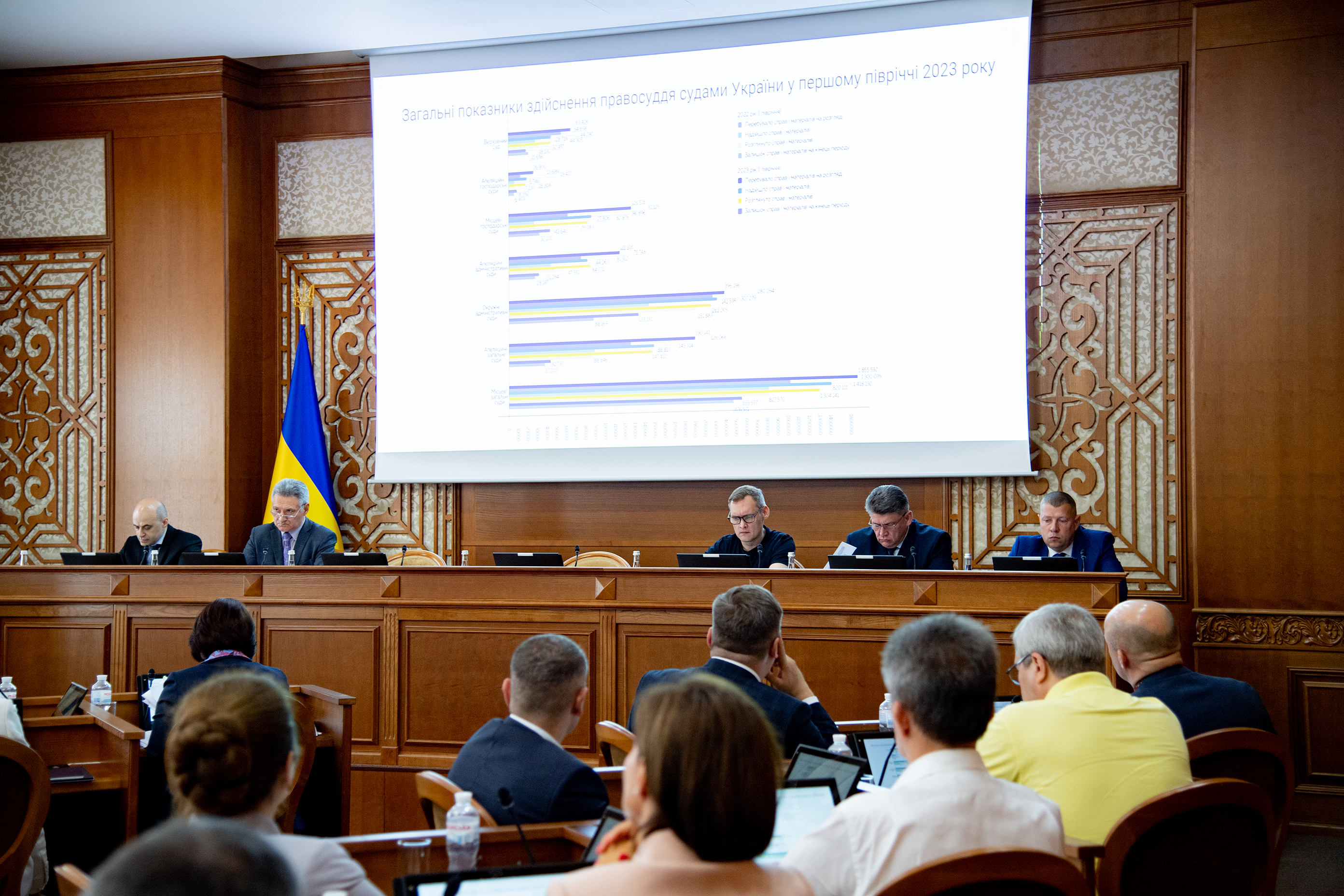
According to the President of the Supreme Court, the war has completely changed the picture of criminal justice; in particular, according to the statistics of the Prosecutor General's Office, more than 100,000 war crimes and almost 17,000 crimes against national security (including collaboration, high treason, violating the territorial integrity and inviolability of Ukraine) have been registered as of 27 July 2023.
Today, Ukraine, its international partners and the world at large are paying close attention to the investigation and prosecution of war crimes. Our country has addressed the whole world with a proposal to set up a special tribunal to investigate the crime of Russian aggression against Ukraine. At the same time, representatives of the judiciary are aware that the main burden of war crimes trials will fall on national courts. And the courts of Ukraine must carry out this task with honour and high standards, so that the world understands that the decisions of the Ukrainian courts are lawful and fair.
Stanislav Kravchenko stressed that great attention should be paid to the investigation and consideration of criminal cases involving violations of the established procedure for military service (military offences).
The number of cases and proceedings in other categories typical of civilian life has not decreased either, although these categories have their own differences under martial law. An example of this is the situation where the legislator has added a separate qualifying feature to the category of criminal offences against property, namely the commission of a crime under martial law, and significantly increased the liability for such an act.
At the same time, we should not forget that the conditions for Ukraine's accession to NATO and membership of the European Union are the fulfilment of requirements relating to the fight against corruption and organised crime, the protection of investments and other requirements. It is therefore equally important to organise properly the examination of those categories of cases which relate to these issues.
In general, the number of cases brought by our citizens before the commercial, civil and administrative courts indicates that the judicial system plays a very important role in ensuring the rights of our citizens to proper and fair protection of their interests in any jurisdiction.
According to the President of the Supreme Court, in order for Ukraine to be recognised worldwide as a state governed by the rule of law, the courts must strictly adhere to high standards of justice, despite all the difficulties. "The whole world is watching us today. If the decisions of the Ukrainian courts are legal and fair, they will be accepted throughout the civilised world," Stanislav Kravchenko stressed.
The second part of his speech was devoted to the urgent challenges facing the Ukrainian judiciary and ways to address them.
One of these challenges is to reassess the appropriate organisation of the work of the courts under martial law, which was justified in the early months of the full-scale invasion, but now no longer fully meets current needs and requirements. This is a matter of urgency and immediate action. In particular, changes in the territorial jurisdiction of courts have not always taken into account the location of pre-trial investigation bodies, which has had an impact on the workload of investigating judges.
Another problem is the resumption of the work of the courts in the areas liberated from the enemy. The resumption of court activities should take into account not only the security situation, but also the organisational capacity of the court to administer justice and the equitable distribution of the workload.
Two courts in the Donetsk region are currently resuming their work, and some courts in the Kherson region have been reopened. "Not only are we resuming work, but together with the High Council of Justice we are also monitoring whether the workload is being distributed evenly," said Stanislav Kravchenko.
Another problem is the inadequate organisation of work on the transfer of proceedings. Stanislav Kravchenko cited the unfortunate example of the courts in the Poltava region, which, having accepted the cases transferred from the Kharkiv courts, have not yet done their job in dealing with them. The issue, which has not yet been resolved, requires the careful attention of the Council of Judges of Ukraine.
Another unpleasant issue that cannot be avoided is the sad and painful situation that occurred in the Supreme Court, the serving of suspicion on the Head of the State Judicial Administration of Ukraine, the serving of suspicion on individual judges of high treason, collaboration, and the fatal traffic accident involving a district court head. All of this leads to major reputational damage. The judiciary is doing everything in its power to respond as effectively as possible to these cases and is cooperating with the investigation.
How can this crisis be overcome? We must not forget that judges are accountable to society and the state. The community of the judiciary should maintain an attitude of intolerance towards this kind of shameful phenomenon. These are serious challenges for the judiciary, but judges must rise to them and contribute to strengthening the rule of law.
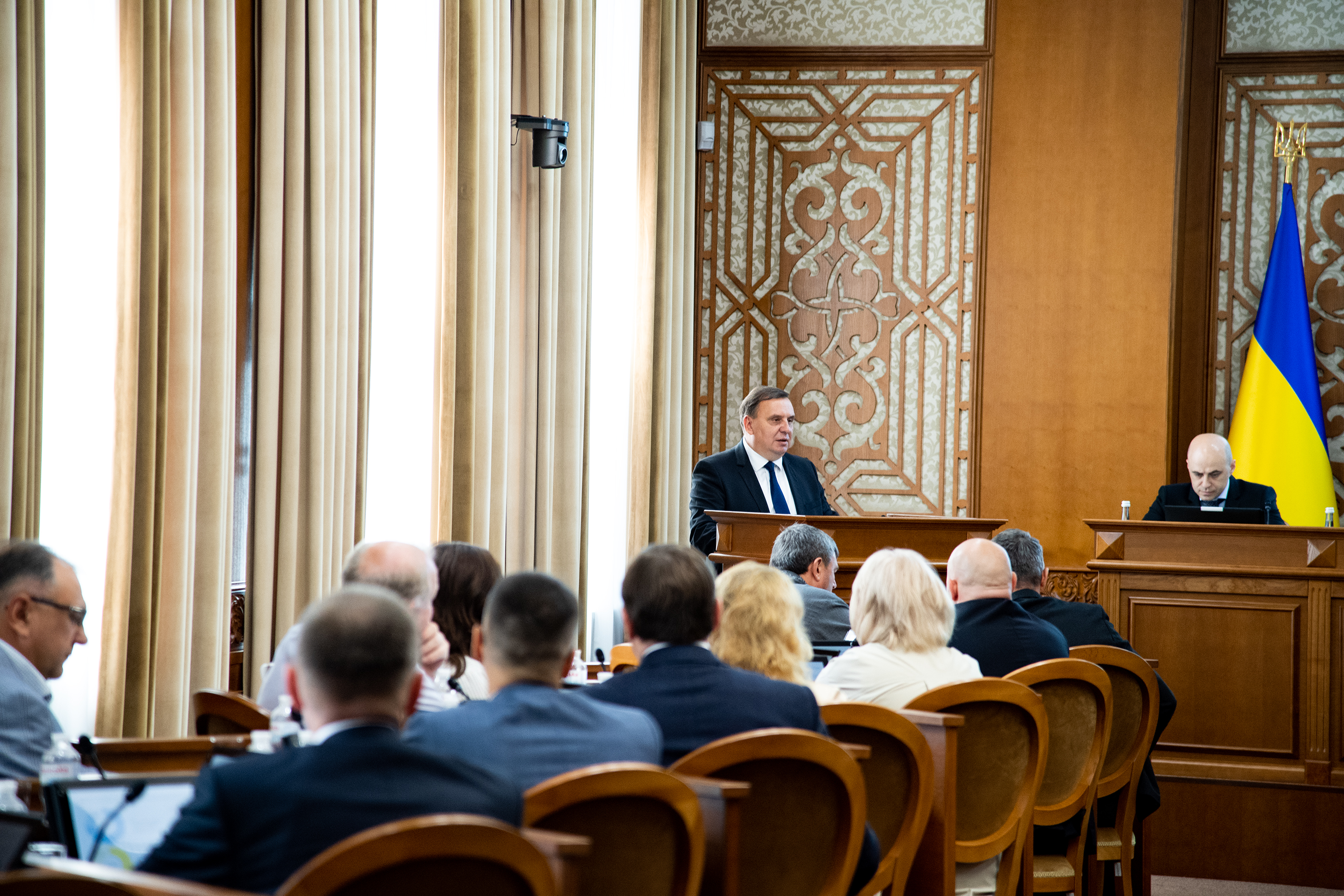
Today, the number of applications to the court is increasing. If court decisions are fair and understandable, if people have a sense of fair treatment in court, then there will be a change for the better.
To do all this, we need to overcome the problem of staff shortages. The High Council of Justice and the High Qualification Commission of Judges are currently operational, meaning that the state has all the mechanisms to resume the process of staffing the courts. In this context, Stanislav Kravchenko called on those present to mobilise their efforts and do everything in their power to staff the courts as soon as possible. Obviously, in this situation, we should talk about changing the procedure for appointing candidates to judicial positions, because now there is no time for the procedures that were prescribed for peacetime conditions.
In addition, the President of the Supreme Court recalled that under the Law of Ukraine "On the Judiciary and the Status of Judges" it is the presidents of courts who are responsible for organising the work of courts in all jurisdictions. The importance of the presidents of the courts should not be underestimated, since, according to the experience of the difficult months of the war, it was the presidents of the courts who played a key role in ensuring the proper functioning of the judicial system under martial law. Moreover, courts of appeal should maintain contact with local courts. All organisational processes in the courts must be carefully organised by people who have taken on this responsibility.
Following recent events, the Supreme Court has revised its approach to the role of each president of the cassation court, with a focus on the requirements of the Law of Ukraine "On the Judiciary and the Status of Judges". The law stipulates that each cassation court is obliged to ensure that certain categories of cases and proceedings are reviewed in cassation, while at the same time ensuring the unity of case law. Each president of a court of cassation is responsible for organising the work of the court and must report annually to the public and to the team of the jurisdiction. The President of the Supreme Court should coordinate the work of these cassation courts and communicate their general positions to the whole of society. The Grand Chamber has a special role to play in ensuring the unity of jurisprudence. This mechanism for ensuring uniformity of case law needs to be improved, but no one doubts that the state needs this body.
In conclusion, Stanislav Kravchenko stressed the need for continuous work of court presidents in their teams, reaction to improper behaviour of courts and court staff, reaction to the needs of the society in the judicial system, conducting trainings with the participation of judges on the application of European law, joint international scientific practical conferences, conducting professional training of judges in the field of military crimes, raising the level of knowledge of pre-trial investigation bodies and prosecutors in such categories of cases as war and military crimes.
According to the President of the Supreme Court, if we all work together to improve the situation in the judiciary, we will be able to overcome all difficulties. Today's joint meeting is a good starting point for this work.
The results of the work of the Supreme Court and the judiciary in the first half of 2023, presented during the meeting, are available here: https://rb.gy/own74.
